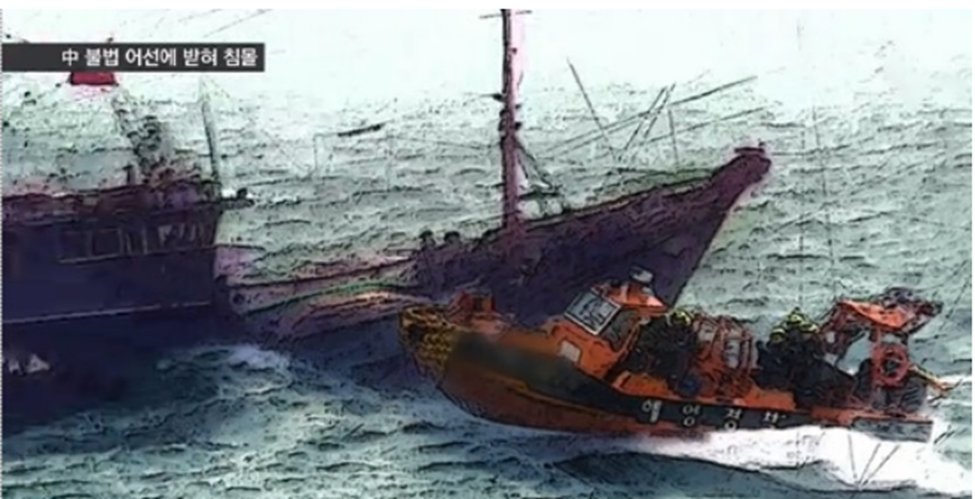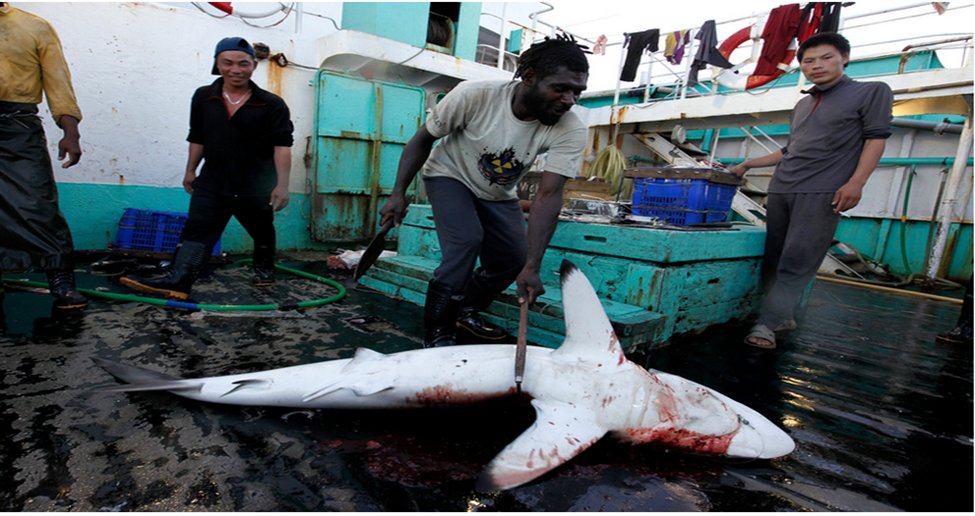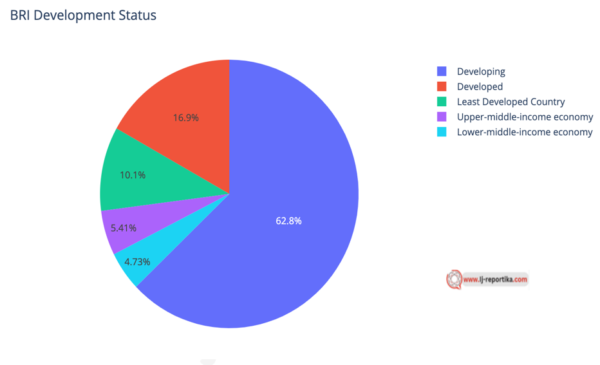1. #China has been involved in illegal fishing in #EEZ of over 80 countries with over 10 million hrs of fishing.
This is a mega report and tweet thread on #Chinese illegal fishing in world's oceans and its impacts.
Read/download the complete report:
ij-reportika.com/the-illegal-ch…
This is a mega report and tweet thread on #Chinese illegal fishing in world's oceans and its impacts.
Read/download the complete report:
ij-reportika.com/the-illegal-ch…

2. The #Chinese fleet is often found guilty of #overfishing,
killing protected species,
falsifying licenses and docs,
#espionage,
seizing territories &
producing tons of sea #waste.
Read/download the complete report:
ij-reportika.com/the-illegal-ch…
#ChinaIllegalFishing
killing protected species,
falsifying licenses and docs,
#espionage,
seizing territories &
producing tons of sea #waste.
Read/download the complete report:
ij-reportika.com/the-illegal-ch…
#ChinaIllegalFishing

3. IUU: #China has been consistently ranked num. 1 on various parameters of illegal, unreported, and unregulated fishing (IUU) rankings.
According to the IUU rankings report 2021, over 60% of its vessels are involved in IUU fishing worldwide.
#ChinaIllegalFishing
According to the IUU rankings report 2021, over 60% of its vessels are involved in IUU fishing worldwide.
#ChinaIllegalFishing

4. #Chinese ships disable their transponders close to EEZ of other countries to avoid being detected by the #AIS system; a practice called “marine radar evasion”.
#ChinaIllegalFishing
Read/download the complete report:
ij-reportika.com/the-illegal-ch…
#ChinaIllegalFishing
Read/download the complete report:
ij-reportika.com/the-illegal-ch…

5. Some of the most prominent types of #Chinese vessels are – #trawlers, #longliners and #squidjiggers.
#ChinaIllegalFishing
Read/download the complete report:
ij-reportika.com/the-illegal-ch…
#ChinaIllegalFishing
Read/download the complete report:
ij-reportika.com/the-illegal-ch…

6. About 20% of the global IUU catch comes from just six western African countries –
#Mauritania,
#Senegal,
the #Gambia,
#Guinea-Bissau,
#Guinea and
#SierraLeone
Read/download the complete report:
ij-reportika.com/the-illegal-ch…
#Mauritania,
#Senegal,
the #Gambia,
#Guinea-Bissau,
#Guinea and
#SierraLeone
Read/download the complete report:
ij-reportika.com/the-illegal-ch…

7. Being over 19,000 km away from #Africa, #China is not traveling that far for fishing only.
They are also actively engaged in smuggling #fentanyl and wildlife products used in Traditional Chinese medicine.
Read/download the complete report:
ij-reportika.com/the-illegal-ch…
They are also actively engaged in smuggling #fentanyl and wildlife products used in Traditional Chinese medicine.
Read/download the complete report:
ij-reportika.com/the-illegal-ch…

8. As the IOR becomes an epicenter of geopolitics, activities of Chinese ships are not limited to fishing legally or otherwise.
These spy ships gather intelligence, conduct #espionage, information surveys, and space tracking in the #IOR, including in India’s #Andaman Islands.
These spy ships gather intelligence, conduct #espionage, information surveys, and space tracking in the #IOR, including in India’s #Andaman Islands.

9. Taking advantage of #corruption, weaker #navies and ambiguous EEZs in countries like Papua New Guinea, #Tonga, #Fiji, etc, the Chinese have fished over 1 million hours in 2022.
Even stronger nations like #Australia & #NewZealand are struggling with Chinese incursions.
Even stronger nations like #Australia & #NewZealand are struggling with Chinese incursions.

10. #China’s presence in #SouthAmerica is posing a serious environmental threat. Huge amounts of waste including bottles, containers of marine oil, and Chinese-labeled jute bags have been collected on Galapagos’ coasts.
Read/download the complete report:
ij-reportika.com/the-illegal-ch…
Read/download the complete report:
ij-reportika.com/the-illegal-ch…

11. In #SouthChinaSea, DWF vessels operate as de facto militia & undertake the construction of reefs & islands in the #Spratly islands.
Thus #Vietnam and the #Philippines have increased their military presence and reclamation work in the region.
ij-reportika.com/the-illegal-ch…
Thus #Vietnam and the #Philippines have increased their military presence and reclamation work in the region.
ij-reportika.com/the-illegal-ch…

12. #Trawling damages marine life, habitats, coral reefs and sea bed.
This is leading to ocean #acidification, warmer seas and reduced #oxygen levels in the water.
Catching a significant amount of bycatch, the vessels are severely overfishing as well.
This is leading to ocean #acidification, warmer seas and reduced #oxygen levels in the water.
Catching a significant amount of bycatch, the vessels are severely overfishing as well.

13. #Disputes : #Chinese fleet is infamous for practicing systemic illegal fishing and #aggressive tactics when confronted by competitors or foreign patrol vessels.
Moreover, they’ve been carrying out illegal construction activities in #Spratly islands, ensuing further disputes
Moreover, they’ve been carrying out illegal construction activities in #Spratly islands, ensuing further disputes

14. #Protests are erupting world over against the Chinese fleets. These fleets are often linked to illegal activities like encroaching other nations’ territorial waters, abusing workers and killing endangered species.
Read/download the complete report:
ij-reportika.com/the-illegal-ch…
Read/download the complete report:
ij-reportika.com/the-illegal-ch…
15. #MaritimeMilitia : #China has accepted that its vessels are pseudo-#military instruments.
Fishermen trained in basic military tactics onboard armed fishing boats are used to assert sovereignty in disputed waters and act as mobile #surveillance stations for #PLA.
Fishermen trained in basic military tactics onboard armed fishing boats are used to assert sovereignty in disputed waters and act as mobile #surveillance stations for #PLA.

16. #FlagDisguise: #Chinese vessels misuse flags of host countries/flags of convenience, in #African countries like #Ghana to avoid getting caught by the AIS.
Vessels Yu Feng 1, 3 & 4 were flying under china’s flag but switched to Ghana’s as they entered Ghana’s EEZ recently.
Vessels Yu Feng 1, 3 & 4 were flying under china’s flag but switched to Ghana’s as they entered Ghana’s EEZ recently.

17. #RacialAbuse : Workers from #Kenya and #Indonesia working onboard #Chinese ships have accused their Chinese managers of mistreatment and racial abuse. Many workers have died onboard due to lack of proper food, water and excessive working hours. 

18. #Pollution : In the #Galapagos archipelago, biologists and experts say Chinese boats in the region are dumping huge amounts of plastic waste into the water.
Similar issues have been reported in Asian and African waters as well.
Similar issues have been reported in Asian and African waters as well.

19. Although #Sharkfishing is banned throughout Central and South America, #Chinese consume it as a delicacy.
This encourages the ships to mock the laws and completely ignore the bans, hiding their illegal catch by transferring it between ships to evade naval patrols.
This encourages the ships to mock the laws and completely ignore the bans, hiding their illegal catch by transferring it between ships to evade naval patrols.

20. #Unemployment : #Chinese trawlers catch all the bottom fish including the small pelagic fish like Sardinella on which more than 330,000 fishermen depend to earn a living.
This led to rampant unemployment as well as deficiencies in local people.
This led to rampant unemployment as well as deficiencies in local people.
21. Read, download and share the complete report only on Ij-Reportika.
ij-reportika.com/the-illegal-ch…
ij-reportika.com/the-illegal-ch…
Please read/share the investigative report ij-reportika.com/the-illegal-ch…
@HKFP @tomgrundy @MercedesHutton @holongsze @hillary_leung @leamokhc @SCMPNews @tammyhongkong @ETemily @jbhavan @EnochYiu
@LuisaTamTam @deweysim @scmp_joma @Denise_tsang @tiffanymeier_ @katabella10
@HKFP @tomgrundy @MercedesHutton @holongsze @hillary_leung @leamokhc @SCMPNews @tammyhongkong @ETemily @jbhavan @EnochYiu
@LuisaTamTam @deweysim @scmp_joma @Denise_tsang @tiffanymeier_ @katabella10
Please read/share the investigative report ij-reportika.com/the-illegal-ch…
@SteveLanceNTD @anJekielek @JenniferZeng15 @sohfangwei @wenzhaocomment @ChinaUncensored @suelinwong @SolomonYue @nathanlawkc @lukedepulford @tengbiao
@SteveLanceNTD @anJekielek @JenniferZeng15 @sohfangwei @wenzhaocomment @ChinaUncensored @suelinwong @SolomonYue @nathanlawkc @lukedepulford @tengbiao
@SolomonYue
@VAGalau
@Uyghur1984
@hongkongishere
@benedictrogers
@IndoPac_Info
@YaxueCao
@CGMeifangZhang
@BoycottHegemony
@yly_michael
Do read and share the report ij-reportika.com/the-illegal-ch…
@VAGalau
@Uyghur1984
@hongkongishere
@benedictrogers
@IndoPac_Info
@YaxueCao
@CGMeifangZhang
@BoycottHegemony
@yly_michael
Do read and share the report ij-reportika.com/the-illegal-ch…
• • •
Missing some Tweet in this thread? You can try to
force a refresh










